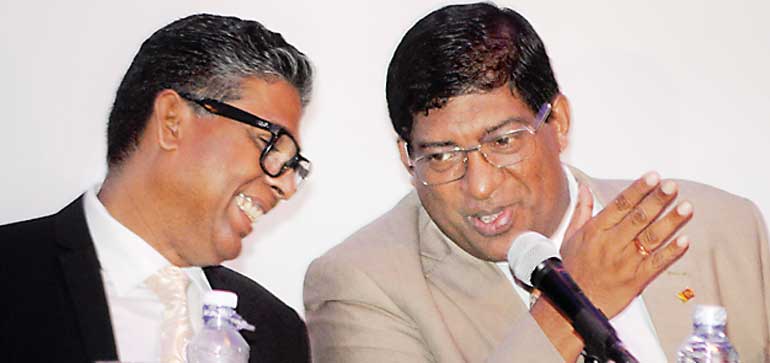Sunday Feb 22, 2026
Sunday Feb 22, 2026
Tuesday, 26 July 2016 00:11 - - {{hitsCtrl.values.hits}}
By Devin Jayasundera
Exporters have to “think afresh” and embrace risk to meet Government aspirations for the sector, Finance Minister Ravi Karunanayake said recently, ticking off the industry for failing to reciprocate policy efforts to resuscitate flailing exports.
In reference to the Government’s efforts on modernising the economy, improving the ease of doing business and making banks less risk averse, Karunanayake noted that exporters had not seized the opportunities of these actions to the full effect.
“We are giving all the attention that is required by you but the Government needs that reciprocity that comes from the private sector. This is where the exporters have not met the challenge.”
He also added that exporters should be at the forefront of influencing the Government to drive the industry forward. “We need to think afresh, we need to take the risk that is expected of us and get the Government also to subscribe to that thinking.”
The latest Central Bank figures show that export earnings dropped by 5.4% in the first quarter of 2016. The long-term view indicates a persistent weakening of the export to GDP ratio which has plummeted from 33.3% in 2006 to 14% in 2014. Reflecting on these lacklustre statistics, Karunanayake expressed his dismay saying that it was an alarming, appalling and sad indictment of the private sector.
 Exporters Association of Sri Lanka Chairman Fazal Mushin with Finance Minister Ravi Karunanayake at the Exporters AGM – Pic by Gitika Talukdar
Exporters Association of Sri Lanka Chairman Fazal Mushin with Finance Minister Ravi Karunanayake at the Exporters AGM – Pic by Gitika Talukdar
Because of the lack of contribution towards tax revenue from the private sector, Karunanayake noted that 80% of the lower income group was unfairly taxed, between 65%-70% of their earnings. He added that if the private sector was able to pay 10% of what is due, 25% of the taxes from the lower end would not need to be collected.
Amidst criticism of its economic policies, the Government is keen to pursue international trade deals to expand its reach to other markets. Justifying the Government’s position, he stressed Sri Lanka’s population is not sufficient as a market, therefore it should be opened up as a supplier to large markets in South Asia and beyond. He added exporters should not be worried and look at ways to utilise potential by creating value additions for re-exportation purposes.
The Sri Lankan export industry has been constantly criticised for years for its highly-concentrated and easily-replicable product basket. But with no notable improvement, almost 64% of the total exports are still contributed by apparel, tea and rubber-based products. The industry is also on the verge of losing its competitive edge as economies such as Bangladesh, Vietnam and Myanmar have lower cost of production.
Given the recent local and global dynamics, Exporters Association Chairman Fazal Mushin described the state of the export sector as ‘running like headless chickens’. He urged his industry colleagues to put away this inert reactive nature and adopt a proactive mindset to successfully recognise and prepare for business volatility.
To increase its competitiveness in exports, Mushin stressed the need to increase Sri Lanka’s ranking in the Ease of Doing Business index to be within the top five in Asia and top 20 in the global rankings. He added that studying the models of Vietnam and Dubai would help to understand what factors attracted top foreign companies and brands to do business in those countries.
Echoing these sentiments, Ceylon Chamber of Commerce Chairman Samantha Ranatunga reiterated that the export sector should be given serious thought considering the exceptional performance of competing countries in the recent past.
“The sands under our feet are shifting. Some countries which were with us have gone way ahead of us. Countries like Vietnam have already grown from $ 20 billion to $130 billion export economy,” he said.